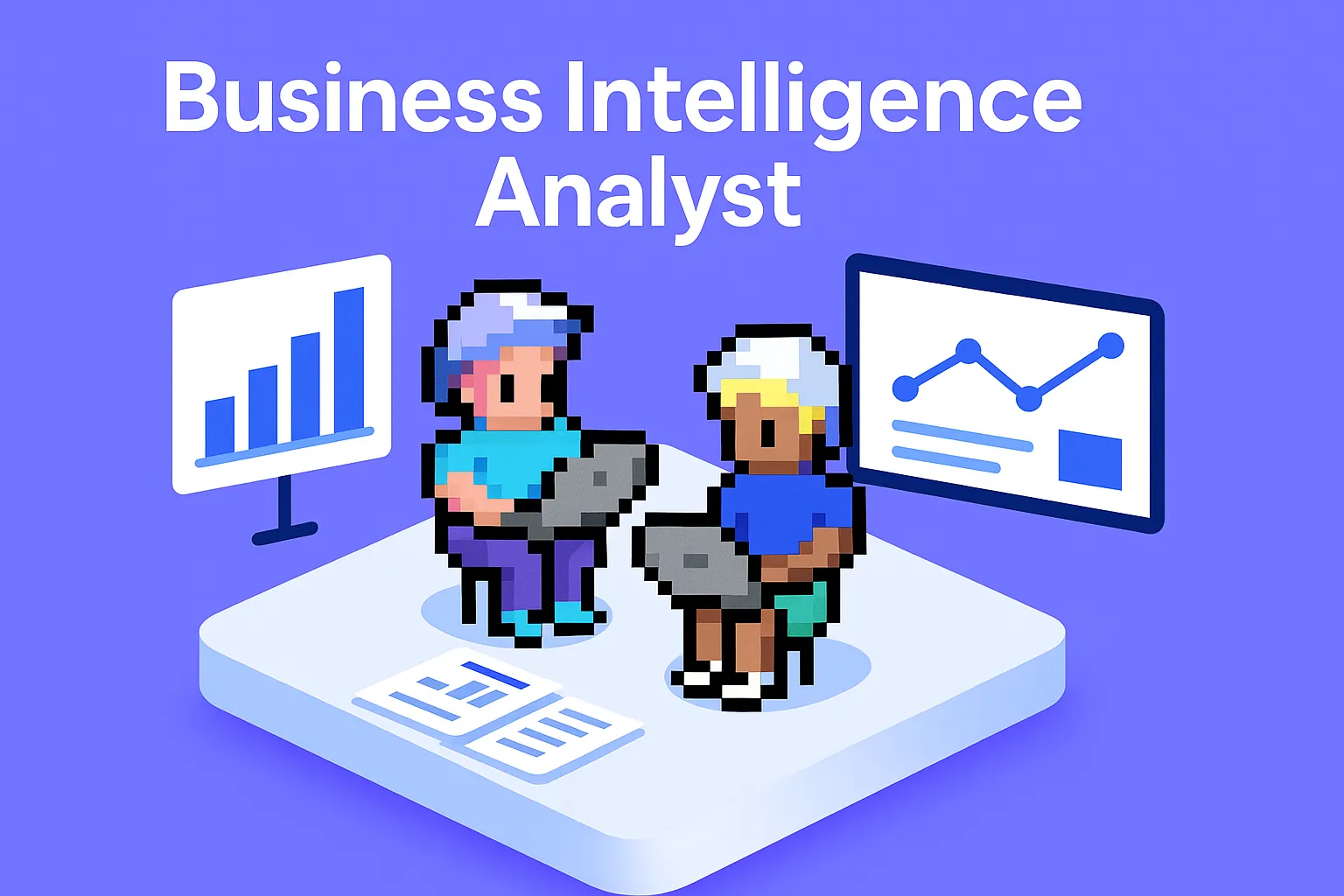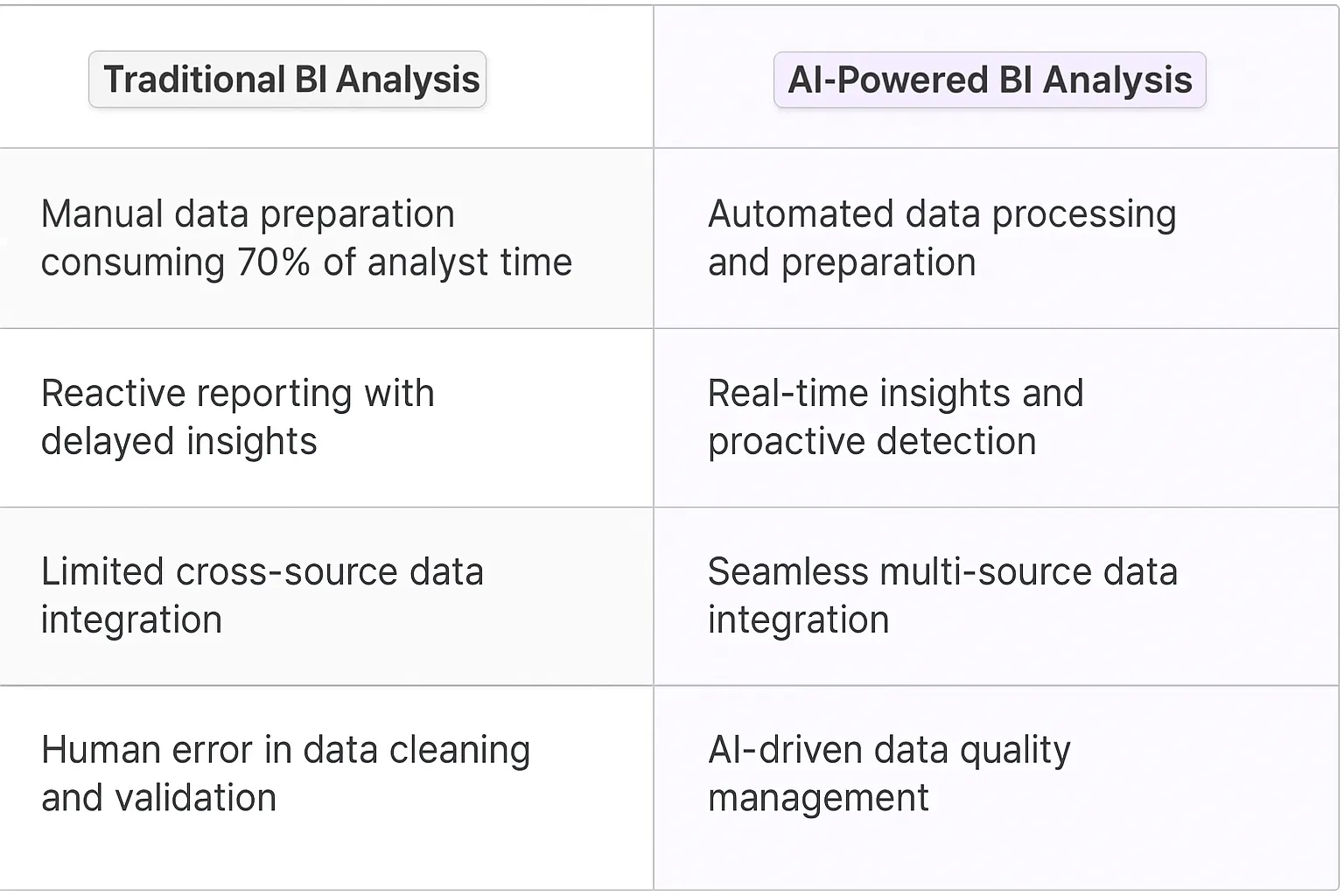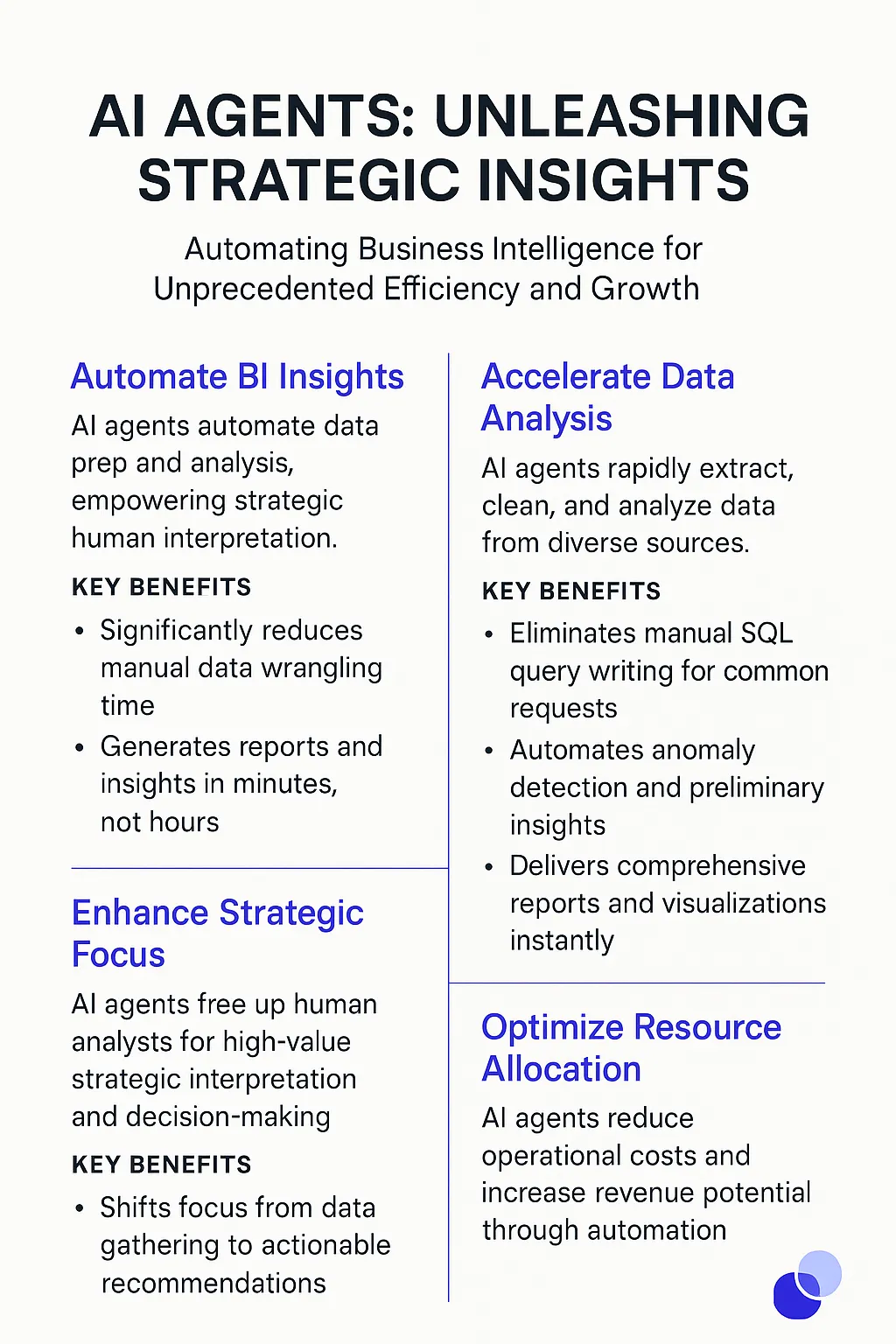Business Intelligence Analysis combines data mining, visualization, and interpretation to drive strategic decision-making. Traditionally, BI analysts spent most of their time wrestling with data preparation and basic reporting. The integration of AI agents marks a pivotal evolution in this field, enabling analysts to focus on higher-order thinking and strategic recommendations while their digital teammates handle the heavy computational lifting.
Modern BI analysis powered by AI agents delivers several core capabilities:- Real-time data processing and anomaly detection- Natural language query processing for instant insights- Automated report generation and visualization- Predictive analytics and trend forecasting- Cross-source data integration and cleaning- Pattern recognition across massive datasets

Traditional BI analysts spent countless hours manually pulling data from various sources, cleaning datasets, and creating repetitive reports. They relied heavily on SQL queries, Excel spreadsheets, and basic visualization tools. The process was not only time-consuming but prone to human error. Analysts often found themselves stuck in the weeds of data preparation rather than focusing on strategic insights.
The integration of AI agents into BI workflows fundamentally transforms how analysts work with data. These digital teammates handle the heavy lifting of data preparation, allowing analysts to focus on what they do best - extracting meaningful insights and driving business decisions.
AI agents excel at pattern recognition across massive datasets, identifying anomalies and trends that human analysts might miss. They can automatically generate complex SQL queries, validate data quality, and create preliminary analysis reports - tasks that previously consumed hours of analyst time.
A key advantage is the ability to process natural language requests. Instead of writing complex queries, analysts can simply ask questions like "Show me sales trends for Q1 compared to last year" and receive instant, accurate responses. This democratizes data access and accelerates the insight generation process.
The real game-changer is how AI agents learn from each interaction. They understand context, remember previous analyses, and can proactively suggest relevant insights based on an analyst's historical work patterns. This creates a compounding effect where the AI becomes increasingly valuable over time.
For organizations, this means faster time-to-insight, more accurate analyses, and the ability to handle larger volumes of data without increasing headcount. BI analysts can shift from being data gatherers to strategic advisors, focusing on higher-value activities like stakeholder communication and strategic recommendations.

Digital teammates in BI roles fundamentally shift how analysts interact with data. Instead of spending hours on manual data preparation and basic analysis, analysts can focus on strategic interpretation and business recommendations. These AI agents serve as force multipliers, handling the heavy lifting of data processing while enabling humans to drive higher-value insights and decision-making.
The real power comes from combining human expertise with AI capabilities. While the AI agent handles routine tasks and initial analysis, the human analyst provides context, validates conclusions, and shapes the narrative around the data. This partnership leads to faster, more accurate insights that directly impact business outcomes.

Business Intelligence Analyst AI agents are transforming how organizations extract meaning from their data. Drawing from my experience working with growth teams and data-driven companies, I've observed these digital teammates becoming essential partners in the analytics workflow. They operate as force multipliers - taking on complex data analysis tasks while human analysts focus on strategic interpretation and storytelling.
The real power emerges when BI analyst agents integrate deeply into existing data processes. They don't just crunch numbers - they actively surface insights, identify patterns, and generate visualizations that would typically require hours of manual analysis. For example, a fintech company I advised deployed BI agents to continuously monitor customer transaction patterns and proactively flag emerging trends, giving their human analysts a massive head start on quarterly reporting.
What makes these agents particularly valuable is their ability to work across different data sources and formats simultaneously. They can pull from SQL databases, spreadsheets, and visualization tools to create comprehensive analysis that would be incredibly time-consuming for human analysts to compile manually. This multi-source synthesis creates richer, more nuanced insights that drive better business decisions.
The retail e-commerce landscape generates massive amounts of data that often overwhelms traditional BI teams. A Business Intelligence Analyst AI Agent transforms how online retailers process and act on their data streams - I've seen this firsthand with several portfolio companies.
Take the case of a mid-sized fashion retailer doing $50M+ in annual revenue. Their BI team was drowning in weekly reporting requests and spending 70% of their time just cleaning and preparing data. By implementing a BI Analyst Agent, they automated the grunt work and unlocked deeper insights.
The agent continuously monitors key metrics like:- Customer lifetime value across product categories- Cart abandonment patterns by geography and device type - Inventory turnover rates mapped against social media sentiment- Price elasticity calculations for each SKU
But the real magic happens in the correlations. When the agent detected that cart abandonment spiked 23% for mobile users during peak shopping hours, it automatically investigated the cause - revealing a payment processing lag on iOS devices. The team fixed the issue before it impacted holiday sales.
The agent also identified that customers who purchased loungewear as their first order had a 40% higher lifetime value. This insight led to restructuring the homepage merchandising strategy, driving a 15% increase in new customer acquisition.
For e-commerce companies, a BI Analyst Agent isn't just about saving time - it's about surfacing the non-obvious insights that create sustainable competitive advantages. The companies that win will be the ones that can turn their data firehose into actionable strategy faster than their competitors.
After investing in several digital health startups, I've observed how BI Analyst AI Agents are transforming healthcare operations. One multi-state hospital network provides a perfect case study of this evolution in action.
The network was struggling with resource allocation across their 12 facilities, with their BI team buried in spreadsheets trying to optimize everything from staff scheduling to supply chain management. They brought in a BI Analyst Agent to augment their team, and the results were striking.
The agent processes real-time data streams tracking:- Patient flow patterns across departments- Equipment utilization rates by time and location- Staff productivity metrics correlated with patient outcomes- Supply consumption patterns linked to seasonal variations
The most valuable insights came from unexpected correlations. The agent identified that specific nurse-to-patient ratios in the ICU led to 28% better patient outcomes, but only when combined with certain equipment placement configurations. This finding helped the network optimize their staffing models and physical layouts.
Another breakthrough came when the agent detected that supply costs spiked by 32% in certain departments during flu season, but only in facilities with older inventory management systems. This led to a targeted upgrade program that saved $3.2M annually.
The network's BI team now spends 80% of their time on strategic analysis rather than data preparation. They've moved from reactive reporting to proactive optimization, using the agent's predictive capabilities to anticipate resource needs weeks in advance.
This shift represents the future of healthcare operations - where AI-powered BI analysis moves beyond basic metrics to uncover the complex interplay of factors that drive both patient outcomes and operational efficiency. The healthcare providers who embrace this approach will build sustainable advantages in both care quality and cost management.
Implementing Business Intelligence AI agents requires navigating complex data ecosystems. The first major hurdle is data quality and consistency - these digital teammates need pristine, well-structured data to deliver accurate insights. Many organizations struggle with fragmented data sources, inconsistent formatting, and legacy systems that don't play well together.
Integration with existing BI tools like Tableau, Power BI, or Looker presents another technical challenge. The AI agent needs to understand the specific syntax and functionality of each platform while maintaining data governance standards. Custom API development and robust error handling become critical for seamless operation.
The human side of implementing BI AI agents is equally complex. Analytics teams often worry about job security when AI enters the picture. The key is positioning these tools as augmentation rather than replacement - they handle routine analysis while humans focus on strategic interpretation.
Training users across different technical skill levels requires significant investment. Some analysts readily embrace AI tools, while others resist changing established workflows. Creating standardized processes for AI-human collaboration, especially around data validation and insight verification, takes time and iteration.
Security and compliance requirements add another layer of complexity. BI AI agents need granular access controls to protect sensitive data while maintaining enough permissions to generate meaningful insights. Organizations must establish clear protocols for handling personally identifiable information (PII) and ensure the AI's outputs align with regulatory frameworks like GDPR or HIPAA.
The financial impact extends beyond initial implementation. Organizations need to account for ongoing costs like API calls, model training, and storage. As usage scales, optimization becomes crucial - balancing query frequency, data processing loads, and response times. Teams should plan for periodic model retraining and performance tuning to maintain accuracy and efficiency.
The partnership between BI analysts and AI agents represents a fundamental shift in how organizations extract value from data. This isn't just about automation - it's about amplifying human analytical capabilities and freeing analysts to focus on strategic thinking. Organizations that successfully integrate these digital teammates will gain significant advantages in speed-to-insight and decision-making quality.
The most successful implementations will be those that focus on the symbiotic relationship between human analysts and AI capabilities. As these systems continue to evolve, we'll see even more sophisticated applications emerge, particularly in areas like predictive analytics and natural language processing. The future of BI analysis lies in this powerful combination of human expertise and AI capability.